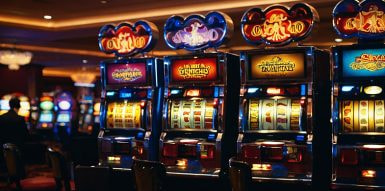CT Gambling Regulatory Agencies
Gambling regulatory authorities in Connecticut were established in 1972, when the Commission on Special Revenue launched the Connecticut Lottery. Up until 1996, the state lottery was operated by the Division of Special Revenue (DOSR). The Connecticut Lottery Corporation (CLC) was then formed to conduct the lottery.
The DOSR was responsible for the regulation of the CLC and all other legal gambling from the USA, Connetcticut. The DOSR later merged with the Department of Consumer Protection (DCP) to become the DCP Gaming Division. The Connecticut Gaming Division now assumes the role of licensing and regulating legal gambling within the state. We have collated some key info and contact details for the Connecticut Gaming Commission for your convenience.
| Department: | Department of Consumer Protection |
|---|---|
| Division: | Gaming Division |
| Address: | 450 Columbus Boulevard, Suite 901, Hartford, Connecticut, 06103-1840 |
| Director: | Peter Hsieh |
| Administrative Assistant: | Donna Rector |
| Phone: | (086) 713-6310 |
| Fax: | (086) 707-1965 |
| Email: | dcp.gaming@ct.gov |
| Website: | www.portal.ct.gov |
The Remit of the Connecticut Gaming Division
The Connecticut Gaming Commission oversees the legalized gambling industry within the state. Through their authority as part of the Department of Consumer Protection, they are responsible for ensuring the integrity of the gambling industry. In turn, they provide consumer protection and confidence, as well as ensuring gambling is beneficial for the state. The regulatory authority produces various gaming revenue statistics, detailing the current and historic contributions legal gambling operations have contributed to the state fund.
The DCP Gaming Division has the authority to license individuals and entities that operate any of the legal types of gambling in CT. The Gaming Division regulates their licensed operators, ensuring that they adhere to state gaming laws. They also ensure compliance with the Tribal-State agreements that allow for the two Indian casinos in the state to operate. The Gaming Division’s investigators are POSTC certified police officers.
The guiding principles of the Connecticut Gaming Division are:
- To reassure the public that gaming is conducted honestly and fairly, through establishing and enforcing regulations
- To provide licensing to suitable parties only to participate in the gaming industry in the state
- Testing of equipment and standards to ensure the integrity of gambling games
- To study the impact of legalized gambling on Connecticut citizens
- To prohibit minors from taking part in any gambling activity deemed legal within the state
- Support and create awareness of prevention, education, and treatment of gambling addiction
Responsibility in Gambling – CT Resources
A key part of the Gaming Division’s role is to protect players. Minimum age restrictions are applied to gambling within the state. To enter a casino, you must be 21 years old. Whilst lottery, off-track betting, and pari-mutual gambling have a minimum age requirement of 18. The Gaming Division collaborates with charities and organizations that offer support for problem gambling.
On the regulator’s official website, there are listed resources for Connecticut residents. Among these are the Connecticut Council on Problem Gambling, and the problem gambling services program of the Department of Mental Health and Addiction Services. The State of Connecticut also funds gambling treatment services through the Bettor Choice Programs initiative.
Types of Legal and Regulated Gambling in CT
Connecticut has very clear legislation and gambling laws, that leaves no ambiguity when it comes to determining what types of gambling are legal in Connecticut. Gambling is illegal unless it is specifically allowed under the General Statutes of Connecticut. For a gambling organization to operate legally, they must hold the appropriate license. Non-profit organizations who want to conduct a gambling event to raise funds must also apply for a permit from the CT Gaming Division. The types of gambling that are legal and regulated in Connecticut are:
- Tribal Casinos
- Lottery
- Pari-Mutuel Betting
- Off-Track Betting
- Charitable Gambling
Pari-mutuel betting on greyhounds, horse racing, and Jai Alai are permitted under Connecticut gaming laws. However, the last of the state’s greyhound racing tracks closed in 2006, and Jai Alai has not been in operation since 2001. Whilst horse racing is authorized, no horse racing tracks have ever operated in Connecticut. Off-track betting was introduced in 1976. Autotote Enterprises Inc. took over operations from the Division of Special Revenue in 1993 and continue to operate the Connecticut OTB.
There are various types of gambling games that charities can use to raise money. The state legalized bingo in 1939. Raffles and bazaars were permitted from 1955. Sealed tickets were authorized in 1987. Since 1972, non-profit organizations were also permitted to provide casino games during Las Vegas Night fundraisers. However, the law was repealed in 2003, prohibiting such organizations from offering any casino-style events.
Casino gambling within Connecticut is only permitted at tribal casinos. There are two compacted tribes in Connecticut, the Mashantucket Pequot Tribe and the Mohegan Tribe. Both have opened a casino resort. The Tribal-State gaming compacts outline the agreements between the tribes and the State of Connecticut Gaming Commission.
Tribal Casinos in Connecticut
There are two casinos in Connecticut which are operated on tribal lands under the federal Indian Gaming Regulatory Act. The Mashantucket Pequot Tribe opened Foxwoods Casino in 1992. Four years later, the Mohegan Tribe opened the Mohegan Sun Casino. Tribal-State gaming compacts contain the legislation agreed for the legal operation of gambling services on tribal lands in Connecticut. Both tribes have established tribal gaming councils, which oversee and regulate gaming operations in their respective reservations.
The tribal gaming councils liaise with the state’s Gaming Division, ensuring that the correct licenses are issued to employees and to approve any policy changes and new games. Under the Tribal-State gaming compacts, the operators can legally offer casino games, lottery games, and certain forms of pari-mutuel betting. The operators must pay a fee to cover the costs of regulating gaming operations incurred by the Connecticut Gaming Division.

Each tribe and the state of Connecticut have entered a memorandum of understanding to allow slot machines to be operated at the casinos. A revenue share agreement was negotiated with the state. In return for a 25% revenue share of profits generated from slot machines, no other commercial casino games can be offered within the state. To date, the tribal casinos have contributed over $8 billion to the state’s general fund.
A third tribal casino is in the pipeline in the state, albeit not on tribal lands. In March 2019, following a lengthy process, the request for the casino in East Windsor was given federal approval. The new gambling resort will be operated jointly by the Mashantucket Pequot and Mohegan tribes. The Tribal Winds Casino in East Windsor was proposed to compete against the MGM Springfield, operating in neighboring state, Massachusetts.
Online Gambling Laws in Connecticut
Whilst there are opportunities to play at top online casinos in the USA, not all states have authorized online gambling. Connecticut is one such state. The Connecticut Gaming Commission does not permit any form of online gambling. Some state gambling legislation leaves room for interpretation when it comes to gambling online, enabling residents to turn to off-shore licensed gambling sites to play.
Yet there is no such grey area when it comes to online gambling in Connecticut. It is illegal to gamble online in Connecticut, even on websites that operate legally in other jurisdictions. Whilst numerous state gaming commissions, including the Pennsylvania Gaming Control Board regulate a wide range of online gambling websites, in Connecticut, you cannot even buy a ticket for the state lottery online.
FAQ
Our research into the Connecticut Gaming Commission involved finding out what CT residents want to know about gambling in the Nutmeg state. If you still have any questions about gambling laws and regulation in Connecticut, check the following section. We have listed the most frequently asked questions and their answers.




